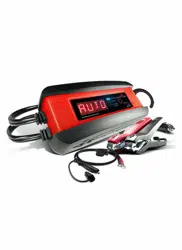Loading ...
Loading ...
Loading ...

• 5 •
1. IMPORTANT SAFETY INSTRUCTIONS
PLEASE SAVE THIS OWNERS MANUAL
AND READ BEFORE EACH USE.
This manual will explain how to use the
charger safely and effectively. Please
read and follow these instructions and
precautions carefully.
NOTE: The charger itself is a stand-alone
device and will function as a battery charger/
maintainer without an internet connection.
However, without a Cloud connection, the
App will not reect the charging progress.
1.1 SAVE THESE INSTRUCTIONS –
This manual contains important safety
and operating instructions.
1.2 Keep out of reach of children.
1.3 Do not expose the charger to rain or snow.
1.4 Use of an attachment not recommended
or sold by Schumacher
®
Electric
Corporation may result in a risk of re,
electric shock or injury to persons.
1.5 To reduce the risk of damage to electric
plug and cord, pull by the plug rather than
the cord when disconnecting charger.
1.6 An extension cord should not be used
unless absolutely necessary. Use of
improper extension cord could result
in a risk of re and electric shock. If an
extension cord must be used, make sure:
• The pins on plug of extension cord are
the same number, size and shape as
those of plug on charger.
• The extension cord is properly wired and
in good electrical condition
• The wire size is large enough for AC
ampere rating of charger, as specied in
section 8.
1.7 Do not operate charger with damaged
cord or plug – replace the cord or plug
immediately.
1.8 Do not operate charger if it has received
a sharp blow, been dropped, or otherwise
damaged in any way; take it to a qualied
serviceman.
1.9 Do not disassemble charger; take it to
a qualied serviceman when service or
repair is required. Incorrect reassembly
may result in a risk of electric shock or re.
1.10 To reduce risk of electric shock, unplug
charger from outlet before attempting
any maintenance or cleaning. Turning off
controls will not reduce this risk.
1.11 WARNING: RISK OF EXPLOSIVE GASES.
a. WORKING IN VICINITY OF A LEAD-
ACID BATTERY IS DANGEROUS.
BATTERIES GENERATE EXPLOSIVE
GASES DURING NORMAL BATTERY
OPERATION. FOR THIS REASON, IT
IS OF UTMOST IMPORTANCE THAT
YOU FOLLOW THE INSTRUCTIONS
EACH TIME YOU USE THE
CHARGER.
b. To reduce risk of battery explosion, follow
these instructions and those published by
battery manufacturer and manufacturer of
any equipment you intend to use in vicinity
of battery. Review cautionary markings on
these products and on the engine.
1.12 Pursuant to California Proposition 65, this
product contains chemicals known to the
State of California to cause cancer and
birth defects or other reproductive harm.
Wash hands after handling.
2. PERSONAL SAFETY PRECAUTIONS
2.1 Consider having someone close enough
by to come to your aid when you work
near a lead-acid battery.
2.2 Have plenty of fresh water and soap
nearby in case battery acid contacts skin,
clothing, or eyes.
2.3 Wear complete eye protection and
clothing protection. Avoid touching eyes
while working near battery.
2.4 If battery acid contacts skin or clothing,
wash immediately with soap and water. If
acid enters eye, immediately ood eye with
running cold water for at least 10 minutes
and get medical attention immediately.
2.5 NEVER smoke or allow a spark or ame
in vicinity of battery or engine.
2.6 Be extra cautious to reduce risk of
dropping a metal tool onto battery. It might
spark or short-circuit battery or other
electrical part that may cause explosion.
2.7 Remove personal metal items such as
rings, bracelets, necklaces, and watches
when working with a lead-acid battery. A
lead-acid battery can produce a short-
circuit current high enough to weld a ring
or the like to metal, causing a severe burn.
2.8 Use the charger for charging only 6 and
12V LEAD-ACID, GEL and AGM-type
rechargeable batteries with recommended
rated capacities of 12Ah (6V) and 12-
59Ah (12V). It is not intended to supply
power to a low voltage electrical system
other than in a starter-motor application.
Do not use battery charger for charging
dry-cell batteries that are commonly used
with home appliances. These batteries
may burst and cause injury to persons
and damage to property.
2.9 NEVER charge a frozen battery.
Loading ...
Loading ...
Loading ...
